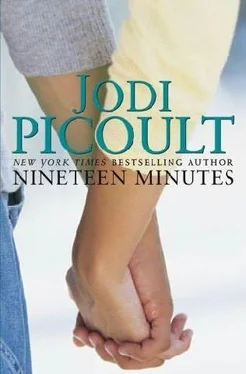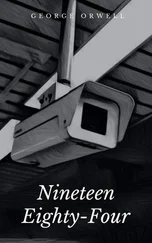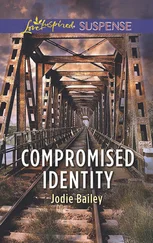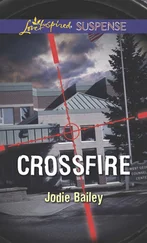Josie was wearing different clothes than the ones she’d been brought here with, which had mysteriously disappeared. No one was admitting to anything, but Josie assumed they were covered with Matt’s blood. In this, they had been right to throw them away: no matter how much bleach was used and how many washings were done, Josie knew she’d be able to see the stains.
Her head still ached from where she’d struck the floor when she fainted. She’d cut her forehead and narrowly avoided needing stitches, although the doctors had wanted to watch her overnight. (For what? Josie had wondered. A stroke? A blood clot? Suicide?) When Josie stood up, her mother was at her side immediately, an arm anchored around her for support. It reminded Josie of the way that she and Matt sometimes walked down the street in the summer, their hands filed into the back pockets of each other’s jeans.
“Oh, Josie,” her mother said, and that was how she realized she’d started to cry again. It happened so often, now, that Josie had lost the capacity to tell when it stopped and started. Her mother offered her a tissue. “You know what? You’ll start feeling better when you get home. I promise.”
Well, duh. Josie couldn’t start feeling any worse.
But she managed a grimace, which might have been a smile if you weren’t looking too closely, because she knew that’s what her mother needed right now. She walked the fifteen steps to the door of her hospital room.
“You take care, sweetheart,” one of the nurses said as Josie passed their pod of desks.
Another one-the one Josie had liked the best, who fed her ice chips-smiled. “Don’t come back and see us, you hear?”
Josie moved slowly toward the elevator, which seemed to get farther and farther away each time she glanced up. As she passed by one of the patient rooms she noticed a familiar name on the clipboard outside: HALEY WEAVER.
Haley was a senior, homecoming queen for the past two years. She and her boyfriend, Brady, were the Brangelina of Sterling High-roles Josie actually had believed she and Matt stood a good chance to inherit after Haley and Brady graduated. Even the wishful thinkers who pined after Brady for his smoky smile and sculpted body had to admit that there was a poetic justice to his dating Haley, the most beautiful girl in the school. With her waterfall of white-blond hair and her clear blue eyes, she had always reminded Josie of a magical fairy-the serene, heavenly creature that floats down to grant someone’s wishes.
There were all sorts of stories that circulated about them: how Brady had given up football scholarships at colleges that didn’t have art programs for Haley; how Haley had gotten a tattoo of Brady’s initials in a place no one could see; how on their first date, he’d had rose petals spread on the passenger seat of his Honda. Josie, circulating in the same crowd as Haley, knew that most of this was bullshit. Haley herself had admitted, first, that it was a temporary tattoo, and second, that it wasn’t rose petals, but a bouquet of lilacs he’d stolen from a neighbor’s garden.
“Josie?” Haley whispered now, from inside the room. “Is that you?”
Josie felt her mother’s hand on her arm, restraining her. But then Haley’s parents, who were blocking a clear view of the bed, moved away.
The right half of Haley’s face was swathed in bandages; her hair was shaved to the scalp above it. Her nose had been broken, and her one visible eye was completely bloodshot. Josie’s mother drew in her breath silently.
She stepped inside and forced herself to smile.
“Josie,” Haley said. “He killed them. Courtney and Maddie. And then he pointed the gun at me, but Brady stepped in front of it.” A tear streaked down the cheek that wasn’t bandaged. “You know how people are always saying they’d do that for you?”
Josie started shaking. She wanted to ask Haley a hundred questions, but her teeth were chattering so hard that she couldn’t manage a single word. Haley grabbed on to her hand, and Josie startled. She wanted to pull away. She wanted to pretend she’d never seen Haley Weaver like this.
“If I ask you something,” Haley said, “you’ll be honest, won’t you?”
Josie nodded.
“My face,” she whispered. “It’s ruined, isn’t it?”
Josie looked Haley in the eye. “No,” she said. “It’s fine.”
They both knew she wasn’t telling the truth.
Josie said good-bye to Haley and her parents, grabbed on to her mother, and hurried even faster toward the elevators, even though every step felt like a thunderstorm behind her eyes. She suddenly remembered studying the brain in science class-how a steel rod had pierced a man’s skull, and he opened up his mouth to speak Portuguese, a language he’d never studied. Maybe it would be like this, now, for Josie. Maybe her native tongue, from here on in, would be a string of lies.
By the time Patrick returned to Sterling High the next morning, the crime-scene detectives had turned the halls of the school into an enormous spiderweb. Based on where the victims had been found, string was taped up-a burst of lines radiating from one spot where Peter Houghton had paused long enough to fire shots before moving on. The lines of string crossed each other at points: a grid of panic, a graph of chaos.
He stood for a moment in the center of the commotion, watching the techs weave the string across the hallways and between banks of lockers and into doorways. He imagined what it would have been like to start running at the sound of the gunshots, to feel people pushing behind you like a tide, to know that you couldn’t move faster than a speeding bullet. To realize too late you were trapped, a spider’s prey.
Patrick picked his way through the web, careful not to disturb the work of the techs. He would use what they did to corroborate the stories of the witnesses. All 1,026 of them.
The breakfast broadcast of the three local network news stations was devoted to that morning’s arraignment of Peter Houghton. Alex stood in front of the television in her bedroom, nursing her cup of coffee and staring at the backdrop behind the eager reporters: her former workplace, the district courthouse.
She’d settled Josie in her bedroom to sleep the dark, dreamless sleep of the sedated. To be perfectly honest, Alex needed this time alone, too. Who would have guessed that a woman who’d become a master at putting on a public face would find it so emotionally exhausting to hold herself together in front of her daughter?
She wanted to sit down and get drunk. She wanted to weep, her head buried in her hands, at her good fortune: her daughter was two doors away from her. Later, they would have breakfast together. How many parents in this town were waking up to realize this would never be true again?
Alex shut off the television. She didn’t want to compromise her objectivity as the future judge on this case by listening to what the media had to say.
She knew there would be critics-people who said that because her daughter went to Sterling High School, Alex should be removed from the case. If Josie had been shot, she would have quickly agreed. If Josie had even still been friendly with Peter Houghton, Alex would have recused herself. But as it stood, Alex’s judgment was compromised no more than that of any other justice who lived in the area, or who knew a child who attended the school, or who was the parent of a teenager. It happened all the time to North Country justices: someone you knew would inevitably wind up in your courtroom. When Alex was rotating as a district court judge, she’d faced defendants she’d known on a personal level: her mailman caught with pot in his car; a domestic disturbance between her mechanic and his wife. As long as the dispute didn’t involve Alex personally, it was perfectly legal-in fact, mandatory-for her to try the case. In those scenarios, you simply took yourself out of the equation. You became the judge and nothing more. The shooting, as Alex saw it, was the same set of circumstances, ratcheted up a notch. In fact, she’d argue that in a case with the massive media coverage this one had, it would take someone with a defense background-like Alex’s-to truly be impartial to the shooter. And the more she thought about it, the more firmly convinced Alex became that justice couldn’t be done without her involvement, the more ludicrous it seemed to suggest she was not the best judge for the job.
Читать дальше












